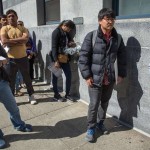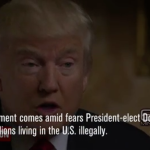The Los Angeles Times has a good deep-dive report into the Trump administration’s “expedited deportation” policy, noting that legal challenges are being planned. The report notes that “… [the] administration’s efforts to step up immigration enforcement and streamline deportation — outlined in memos from Homeland Security Secretary John F. Kelly — could affect far more people, including potentially most of the estimated 11 million immigrants living illegally in the United States.”
And it adds that “… one part of that effort — the expanded use of what the law refers to as expedited removal — is almost certain to face a constitutional challenge in the courts.”
The Times backgrounds that the U.S. Supreme Court has repeatedly said that immigrants, even those who are here illegally, are protected by the Constitution’s guarantee of due process of law. The justices cite the 5th Amendment, which says, “No person shall be … deprived of life, liberty or property, without due process of law.” Because the language refers to “no person,” not to “no citizen,” its protections cover “even one whose presence in this country is unlawful, involuntary or transitory,” the court said unanimously in 1976.
But how much process is due for immigrants who entered illegally or overstayed their visas remains “a gray area,” said UCLA law professor Hiroshi Motomura.
Read the very fine not-fake-news report here:
Trump’s fast-track deportations face a legal hurdle: Do unauthorized immigrants have a right to a hearing before a judge?
The Los Angeles Times has a good deep-dive report into the Trump administration’s “expedited deportation” policy
San Francisco Newspaper Profiles Immigration Courts in Near-Chaos

Photo: Santiago Mejia, The Chronicle Second from right: Mike Lee, from South Korea, and others wait in line to go inside the U.S. Citizenship & Immigration Service building located at 630 Sansome Street on Thursday, Feb. 23, 2017, in San Francisco, Calif. Lee, a molecular biology student at UC Berkeley, said he was going in for a naturalization interview.
It may be a “sanctuary city,” but the federal immigration courts in San Francisco are not immune from the backlog and lack of legal representation found in the rest of the country. The San Francisco Chronicle has a profile of the situation online, noting that “… since [President] Trump took office Jan. 20… U.S. Immigration and Customs Enforcement, which runs the detention facilities, has increasingly refused to release immigrants on bond after their arrest. Nieblas, the former lawyers’ association president, said the same agency is also refusing to settle once-routine cases and forcing immigrants to litigate them in court.”
The report notes that “… in most court cases, they’re on their own. Unlike criminal defendants, immigrants have no constitutional right to legal representation, and a recent study found that 37 percent were represented by lawyers, mostly from nonprofit organizations charging no fees. For immigrants in detention, only 14 percent had lawyers.
Some studies indicate that people are five times more likely to win the right to say in the U.S. if they have a lawyer. Unlike criminal defendants, who are legally entitled to representation, immigration cases are considered “civil” and no such right exists.
The Chron notes that the legal-representation issue “… is percolating in San Francisco, where Mayor Ed Lee has approved $1.5 million in city funding for immigration lawyers at nonprofit agencies but opposes Public Defender Jeff Adachi’s request for $7 million to hire 10 staff attorneys to represent detained migrants.”
Read the story here: Immigration courts clogged with 2-year backlog
Trump Immigration Crackdown Hits Backlogged Courts
BuzzFeed is deep-diving into the problems of a backlogged immigration courts system as President Trump gears up his enforcement and deportation plans. The report notes that “… judges and lawyers interviewed by BuzzFeed News described hearings scheduled four, five, or even six years out. Already facing a crushing caseload, immigration judges are bracing for more strain as the Trump administration pushes ahead with an aggressive ramp-up of immigration enforcement with no public commitment so far to aid backlogged courts.”
And as background the websites notes that “… immigration courts, despite their name, are actually an arm of the US Department of Justice… [the][ lawyers from the US Department of Homeland Security prosecute cases. Rulings can be appealed to the Board of Immigration Appeals, which is also part of the Justice Department, and then to a federal appeals court.”
The report also notes that more than a half-million cases are pending immigration court attention. Read the report here: https://www.buzzfeed.com/zoetillman/backlogged-immigration-courts-pose-problems-for-trumps-plans?utm_term=.qeqnQJxo3#.wxBYOm5nr
SF-Based Immigration Courts Getting Testy

Official seal of the Executive Office of Immigration Review, which operates the U.S. immigration courts.
The federal immigration courts, already over-booked with a half-million pending cases and the focus of President Trump’s crackdown strategies, are getting a bit testy out San Francisco way. A reporter with the East Bay Express, a small but scrappy newspaper, wrote about being asked to leave a proceeding.
The story paints an alarming picture of federal agents lacking transparency. While not a direct part of the story, it also illustrates that the “judges” actually work for the Justice Department and are not regular federal judges.
Read the report here:
I Was Kicked Out of Federal Immigration Court — Because I’m a Journalist | East Bay Express
Trump Ponders Next Steps After Court Nixes Immigration Order

Several prominent legal experts are encouraging President Donald Trump to withdraw his current order and redraft it. | AP Photo
The D.C.-based Politico newspaper is outlining what options President Trump’s team has after the California-based 9th Circuit appeals court nixed his travel order this week. Politico said the Trump group was “… licking their wounds following a stinging appeals court defeat, President Donald Trump’s aides went into triage mode Friday as they consider options for salvaging his contested travel ban executive order.”
The story notes that “… Trump rarely backs down from a fight, but there were initial signs that the White House might not proceed as originally expected with an emergency application to the Supreme Court. Legal experts said it was doubtful Trump could muster what he’d need to get immediate relief there: the votes of five justices on the high court, which remains shorthanded with only eight justices. A 4-4 deadlock would leave the ruling suspending enforcement of Trump’s ban in place.”
See the story here: Trump team mulls next steps on travel ban order
Trump’s Immigration Plan Brings Several Early Legal Challenges

Demonstrators gather outside the Trump International Hotel in Washington on Sunday to protest President Trump’s executive order on immigration. (Oliver Contreras/For The Washington Post) (Oliver Contreras/For The Washington Post)
President Trump’s immigration orders over the weekend brought both protests and legal challenges, with several judges ordering halts to the program and scholars offering opinions. The Washington Post had a good article outlining the civil concerns, including listing some of the groups opposing the move:
“… the American Civil Liberties Union, which won the injunction from a New York judge Saturday, immigrant legal aid societies, public-interest groups and the alliance of 16 state attorney generals.”
The story also predicted more challenges under both constitutional grounds and legal decisions over decades.
See the WaPo story here:
CM Publisher Makes Case For Bi-Partisian Fix on Immigration Court
Courts Monitor Publisher Sara Warner, in a Huffington Post blog, makes her case that fixing the swamped immigration courts should be a low-hanging issue for bi-partisian action. Although, perhaps the parties have differing motivations.
See her argument here:
Swamped Immigration Courts Are A Bi-Partisian Fix Opportunity
Education Nominee Brings School Choice To The Federal Spotlight

Children hold up “Parent Revolution” signs during a press conference held next to Desert Trails Preparatory Academy in Adelanto in 2013. Parents used a state law to transform their local low-performing public elementary school into a not-for-profit charter campus. (Los Angeles Times)
As Democrats leveled sharp questions at Betsy DeVos, president-elect Donald Trump’s education nominee, this week, they stressed her decades of support for the charter school movement. Clearly, the Trump Administration and the GOP-controlled Congress will make “school choice” a spotlight issue, including the “parent trigger” movement that didn’t really come up in the DeVos questioning, perhaps because her efforts have mostly been in Michigan.
Parent trigger is the idea that parents can more or less take over a failing school. A half-dozen states have some level of parent trigger law, but the one that’s been most lawsuit-tested is California’s. The Golden State actually passed the nation’s first such law in 2010, and of course litigation came shortly after.
Natasha Lindstron, a respected reporter who has covered the California Parent Trigger since its passage, offers a good overview report here http://hechingerreport.org/parent-trigger-showdowns-loom-nationwide/
And if you’d like to see how The Los Angeles Times, which supported the original parent trigger legislation, feels about it now, check that out here:
http://www.latimes.com/opinion/editorials/la-ed-parent-trigger-20150803-story.html
What Trump Could Mean To Asbestos Lawsuit Scandals
Trump’s Election Boosting Efforts For ‘Civil Gideon’ Style Reform
One impact of the pending Trump administration is already being felt as some states and cities are preparing funds to fight deportation. While it’s only one part of the issue, the funding is a boost to the movement for a “civil Gideon” policy that would provide a right to an attorney in some civil cases – like the right to an attorney for criminal cases. The Gideon case was the policy-setting decision for that criminal-case right.
Immigration advocates have long argued that some deportation cases should be among those requiring representation, especially when children are involved. Funding has always been part of the discussion, but some governments are finding cash in the wake of President-Elect Trump’s victory. For example, the Los Angeles Times reports that LA city and county leaders have “… unveiled a $10-million fund to provide legal assistance for residents facing deportation, the region’s boldest move yet as it prepares for an expected crackdown on illegal immigration by Donald Trump. If approved by lawmakers, Los Angeles’ two top government agencies could find themselves in the position of using public funds to challenge policies sought by the White House and Republican Congress.”
Similar efforts are under way in New York, San Francisco, Chicago and the state of New York.
Read more here:
http://www.latimes.com/local/ lanow/la-me-ln-lafund- 20161219-story.html



